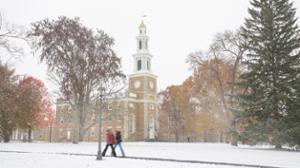
An essay by Professor of History John Eldevik, "(Re)Visions of the World: Prester John in Twelfth-Century Bavaria," was published this month in the edited volume Visions of Medieval History in North America and Europe: Studies on Cultural Identity and Power (Brepols).
The article discusses the circulation of the earliest versions of the so-called Letter of Prester John, a forged document in which a fabulously wealthy Christian ruler in Asia describes the marvels and wonders of his realm to the Byzantine emperor, with an eye toward understanding how medieval copyists integrated the text into pre-existing manuscript books.
While the Letter has long been viewed as a piece of political propaganda crafted by an author, or authors, in the circle of German emperor Frederick Barbarossa in the mid-twelfth century, Eldevik uses this manuscript-based methodology to propose an alternate context for its origins, namely in a south German monastery whose monks were contemplating not only contemporary royal politics but everything from history, to the Crusades and the apocalypse.
Posted November 1, 2022


